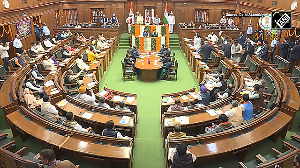The United Kingdom-based Indian lawyers are up in arms against a reported move by the Indian government to allow foreign law firms to practice in the country without insisting on a reciprocal arrangement in Britain.
The British Indian Lawyers Association has shot off a letter to the Union Law Minister, Hansraj Bharadwaj, suggesting that foreign firms should be allowed to practice in India or to render legal assistance to multinational companies "only if there is a reciprocal arrangement whereby the Indian lawyers are allowed to practice in the UK."
The association, headed by Gautam Banerji, has also impleaded itself in the ongoing case in the Bombay high court filed by the Lawyer's Cooperative, a legal service provider in matters of public interest, against the entry of foreign lawyers.
In the representation made to Bharadwaj, the Association said: "It appears the Bombay high court by its interim order has held that establishing a firm to provide legal assistance and/or for executing documents, negotiations and settlements of documents would certainly amount to practice of law."
On September 17, the Union ministry of law and justice, circulated a note proposing liberalisation in the legal services sector in the country. The Society of Indian Law Firms (SILF) responded to this note on November 15 saying the government's proposal is premature because it did not conform to the procedure laid down by the World Trade Organisation's General Agreement on Trade in Services.
The association said: "The assurances given by the foreign law firms that they will abstain from practice in India are worthless. It is certainly their intention not to act as litigators in Indian courts. Litigation provides a disproportionate level of income to Indian lawyers."
"Taking into account inter alia the low level of fees and the lengthy time periods over which Indian court cases are resolved, it is not worth the time and effort foreign law firms to enter into litigation practice as the financial returns from such practice would probably not justify their investment. This assurance therefore was made for sound commercial reasons," it added.
Vaishnav Amba, director of the association, said: "If foreign law firms are allowed to practice in India or to render legal assistance/advice, the same should be so allowed only against a reciprocal arrangement whereby the Indian lawyers are allowed to practice in those foreign countries, to the legal practitioners of which the Indian legal market is opened for legal practice."
Ashok Sancheti, managing partner of Morgan Walker, told PTI today, "all that we want is reciprocal arrangement -- Indian law firms should be permitted to function here."
"If government of India is to open up the legal profession, they must do so on reciprocal basis so that Indian lawyers can come, work and settle down here."
Concurring with Commerce Minister Kamal Nath that the 21st century is going to be India's century, Sancheti, who is also a member of the New York State Bar Association, said "one-fifth of the world's lawyers are Indians. They will work not only in India but would like to work in New York, Tokyo, Singapore and London."
He said the British legal firms want to work in India, which is emerging as a booming market, but they are silent on Indian lawyers coming and working in the UK.
He cautioned that the legal profession in India would face the same fate of accountancy firms unless there was reciprocity. "See what happened to accountancy firms. In just five to seven years, the entire accountancy business has been taken over by foreign firms in India. The same thing will happen to the legal firms," he cautioned.
Sancheti said: "As India emerges as the third largest economy in the world it will have to rely upon its own legal profession and lawyers to function around the globe."
Last year, an MoU was signed between the All India Bar Association and the Law Society of UK and Wales, where the AIBA dropped its objections to the entry of foreign lawyers, on the basis of assurances that foreign lawyers would not look to practice litigation or appear in courts.
Adish Aggarwala, chairman of the association, said that before allowing foreign lawyers to practice in India, "Indian lawyers should have the right to practice in England and Wales without having to pass the Qualified Lawyers Transfer test."
The Indian Advocates Act does not contain a requirement similar to the Qualified Lawyers Transfer Test. The Act provides that foreigners may be admitted as advocates if Indian nationals are permitted to practice law in their country.
For work permits in the UK, it is first necessary for the employer to show that the job cannot be filled by a resident, while no such law exists in India.
There are also onerous restrictions under English immigration law for other categories of persons intending to enter the UK to seek employment from non-EU countries. "We have not received any assurance or indication of reciprocal opening up of the UK market for Indian lawyers to practice foreign law from the UK yet," a leading Indian lawyer said.
Foreign law firms are busy preparing to hit the ground running whenever the doors to the Rs 60 crore (Rs 600 million) commercial legal services market are thrown open in India.
With foreign investment pouring into a rapidly growing economy and Indian businesses conducting more foreign transactions, India is an extremely attractive market for overseas law firms. So they have set up India practice desks at their head offices, have been hiring Indian lawyers and law graduates and forging ties with Indian law firms.







 © 2025
© 2025